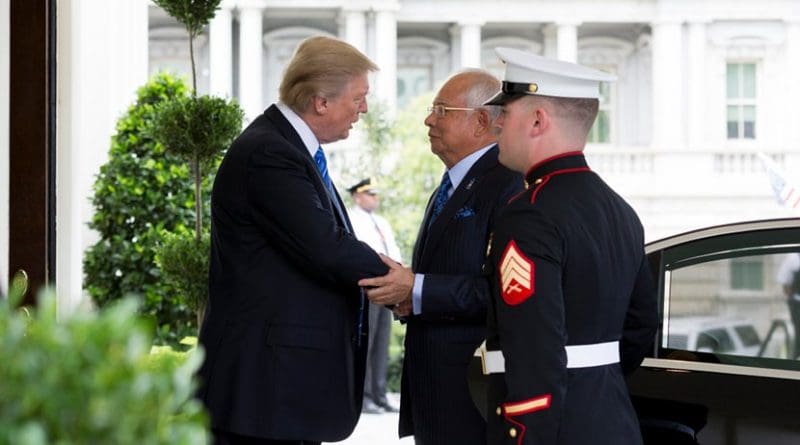Is A Malaysian Spring In The Offing?
By UCA News
Malaysians will vote in parliamentary elections in the next few months. Whatever the outcome, the stage is being set to determine its future – booming, multicultural nation or basket case.
Just over four and half years ago on May 5, 2013 the incumbent Barisan Nasional (BN) led by Prime Minister Najib Razak won 133 seats in the 222-seat parliament. The informal opposition coalition, Pakatan Rakyat, led by now jailed leader Anwar Ibrahim, won an unprecedented 89 seats and a morale-boosting 50.87 percent of the popular vote.
Ever since, Malaysia’s vibrant multicultural identity has become increasingly brittle. So what can be expected from a country that is in danger of becoming increasingly segregated along racial and religious lines?
Leaders in the prime minister’s United Malay National Organisation – the dominant party in the BN coalition – have played into fears that the Malays, who form part of a group known as bumiputeras, which means “sons of the soil” and which refers both to Malays and to a number of indigenous groups, will lose their special privileges if the coalition falls.
Still, since the 2008 general election there’s been a new feeling in the country that political change is a matter of time. For decades, Malaysian elections were foregone conclusions, with the vast majority of people voting for the same party their whole life, creating only small electoral shifts.
The shock effect of the economic downturn in the run-up to that election combined with institutionalized racism and systemic social injustice and rampant corruption highlighted by the new media shifted the political balance.
An opposition coalition of parties now led by 92-year-old former strongman prime minister Mahathir Mohammad is hoping to capitalize on this.
Mahathir fell out with Najib over the disappearance of billions of dollars from the 1MDB state fund which is the subject of money-laundering investigations in at least six countries including Switzerland, Singapore and the United States. American investigators allege that U.S. $681 million of the state firm’s money was paid to the prime minister, a charge Najib denies.
With support for the party and BN apparently slipping further among all ethnic communities due to a combination of a weakened economy, rising inflation, ethnic and religious tensions, crime and the 1MDB scandal, Najib and UMNO reacted by encouraging a stricter brand of Islam, policed by the state, to tighten control the population.
University Malaya law professor Shad Saleem Faruqi after writing an op-ed published in national newspaper The Star last monthon the subject has come under police investigation.
Curbing dissent
Still, few are surprised by the extent the government has gone to curb dissent. Under the pretext of safeguarding Malay hegemony, Najib has courted the Pan-Malaysian Islamic Party (PAS), an Islamist opposition party that is growing more extreme, by co-opting its Islamist agenda. PAS leader, Abdul Hadi Awang, who has declared that “Islam has to be the leader and ruler … Let’s not place religion and politics in separate corners”, is now seen regularly beside the prime minister.
Islam was less an issue at the last election. At the time, PAS, then part of the opposition coalition, spoke more of a welfare state than an Islamic one. However, as fears now grow of rising intolerance in the multi-ethnic country, Malaysia’s monarchy issued a rare statement expressing their concern.
The country’s sizeable Chinese, Indian communities and non-Muslim native communities, already chafing under rules guaranteeing Muslim Malays preferences in politics, business and education are alarmed.
Critics say Najib’s drive to instil “Islamic values” in the multicultural nation comes at a larger cost – further divisions in society, erosion of the country’s significant accomplishments and an undermining of the foreign investor the confidence it has built over the years.
Efforts to win votes for the party come at the expense of what’s good for the country, they note.
Najib is expected to dissolve parliament and call for elections in the February-March period and ride on the expected positive mood in the financial markets during the Lunar New Year. The first day of Chinese New Year falls on Feb. 16 and the festival ends 14 days later with Chap Goh Meh on March 2.
The timing is said to be based on the expected release in April-May of the opposition’s pro-democracy champion, Anwar Ibrahim, from prison where he is serving a five-year term for sodomy, which he says is a trumped up charge by Najib to sideline him from politics.
Anwar may be disqualified from the elections but the government is aware of his drawing power and eloquence. After all that has happened since the last election, Najib and his government are easy targets.
The time-line also allows BN coalition party leaders to use the Lunar New Year festivities to reach out to ethnic Chinese voters who by and large have deserted them for the opposition.
Muslims make up 60 percent of Malaysia’s 28 million people, while Christians account for about 9 percent with a majority in the two Borneo states of Sabah and Sarawak. Christians in the two states feel under siege from Islam-centric policies created at federal level outside their states.
There is impatience to gain equal rights and fairer chances for all in multicultural Malaysia. The coming election is an opportunity for Malaysians to peaceably loosen the grip the government has around their necks.

